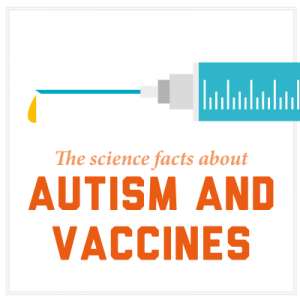The Science Facts about Autism and Vaccines
What started the rumors?
1998: Lancet published a paper by Dr. Andrew Wakefield it was a dramatic study that found a connection between autism and vaccines
The Study Had Some Problems:
- Not based on statistics
- No control group
- It relied on people’s memories
- Made vague conclusions that weren’t statistically valid
No Link was Found, so people started investigating his claims
[Tweet “No link to autism was found in ANY case, in all of the studies.”]
Following Dr. Wakefield’s study, here’s what other more rigorous studies found:
-
- 1999: A study of 500 children no connection was found
- 2001: A study of 10,000 children still found no connection
- 2002: A study from Denmark of 537,000 children found no connection
- 2002: A study from Finland of 535,000 children. Guess what? No connection
- 2004: Lancet released a statement refuting the original findings
“They had conducted invasive investigations on the children without obtaining the necessary ethical clearances… picked and chose data that suited their case; they falsified facts.” - 2005: A review of 31 studies covering more than 10,000,000 children, also found no connection
- 2012: A review of 27 cohort studies, 17 case control studies, 6 self- controlled case series studies, 5 time series trials, 2 ecological studies, 1 case cross-over trial covering over 14,700,000 children
No link to autism was found in ANY case, in all of the studies.
Vaccine Vilification Survives
- 1/4 of U.S. parents U.S. parents believe some vaccines cause autism in healthy children
- 1.8% of parents opt out of vaccines for religious or philosophical reasons
- There have been 0 credible studies linking vaccines to autism
- Recently an anti-vaccine religious community has seen measles outbreaks
[Tweet “There have been 0 credible studies linking vaccines to autism”]
Although Declared Eradicated in 2000…
- France reported a massive measles outbreak with nearly 15,000 cases in 2011
- The U.K. reported more than 2,000 measles cases in 2012
Before Widespread Vaccinations of Babies
- in 1980, 2.6 million deaths from measles
- in 2000 562,400 deaths 72% of babies vaccinated
- in 2012, 122,000 deaths 84% of babies vaccinated
In the United States, Whooping Cough Shot Up in 2012 to Nearly 50,000 Cases
A new study concluded that vaccine refusals were largely to blame for a 2010 outbreak of whooping cough in California.
It is clear that immunization protects children from disease and saves lives. Outbreaks of many deadly diseases are on the decline globally, thanks to vaccinations. Immunizations can help eradicate many dangerous childhood diseases. Just like Smallpox, they too can be wiped off the face of the Earth. In the U.S., we almost had Whooping Cough beat in the 80s — then Dr. Wakefield’s fabulously flawed paper was published:
- 1960s – 150,000 cases of whooping cough
- 1960s – Widespread vaccinations introduced
- 1970s – 5,000 cases of whooping cough
- 1980s – 2,900 cases of whooping cough
- 1998 – Dr. Wakefield’s paper published
- 2004 – 26,000 cases of whooping cough
- 2012 – 50,000 cases of whooping cough
Common Vaccine Myths
- Vaccines are ridden with toxic chemicals that can harm children
Thimersol, the chemical being referenced, does contain mercury. However, thimersol has been removed from scheduled vaccines and only resides in the seasonal flu vaccine. - The decision to not vaccinate my child only affects my child
Un-vaccinated children who contract a disease can infect infants yet to be inoculated, the small percentage of people whose vaccines did not take, and people with compromised immune systems.
- Receiving too many vaccines at once can override a baby’s immune system
Baby’s immune systems are strong enough to defend from the day to day viruses and bacteria with which they come in contact; they can also handle the vaccines. Remember, vaccines use deactivated viruses in their ingredients.
- Drug companies just do it to make profits
According to the WHO, estimated 2013 global revenues for all vaccines is around $24 billion, which only accounts for approximately 2 – 3% of the total pharmaceuticals market.
Vaccines Work!
Positive effects of vaccines:
- Helped eradicate Smallpox
- Save about 8 million lives every year
- Significantly reduce disease in the world
- New and underutilized vaccines could avert nearly 4 million deaths of children under the age 5 by 2015
Related Resources
- Five Meaningful Jobs in Public Health
- What is Epidemiology and What Does an Epidemiologist Do?
- Five TED Talks to Understand the Most Pressing Healthcare Problems in America
Sources:
- http://www.bmj.com/content/342/bmj.c7452
- http://www.cdc.gov/pertussis/outbreaks/trends.html
- http://www.cdc.gov/vaccines/pubs/pinkbook/pert.html
- http://www.npr.org/blogs/health/2010/02/lancet_wakefield_autism_mmr_au.html
- http://www.npr.org/blogs/health/2010/02/lancet_wakefield_autism_mmr_au.html
- http://skepticalraptor.com/blog/wp-content/uploads/2013/05/Vaccine-Market-Value.pdf
- http://www.theverge.com/2013/10/21/4767530/vaccine-deniers-inside-the-dumb-dangerous-new-fad
- http://upworthy.com/got-3-minutes-heres-everything-you-need-to-know-about-vaccines-and-their-controversy
- http://www.slate.com/blogs/bad_astronomy/2013/08/26/antivax_communities_get_measles_outbreaks_linked_to_denial_of_vaccines.html
- http://www.slate.com/blogs/bad_astronomy/2014/04/24/global_vaccination_week_2014_worldwide_effort_to_increase_immunizations.html
- http://www.slate.com/articles/news_and_politics/jurisprudence/2013/08/anti_vaxxers_why_parents_who_don_t_vaccinate_their_kids_should_be_sued_or.html

